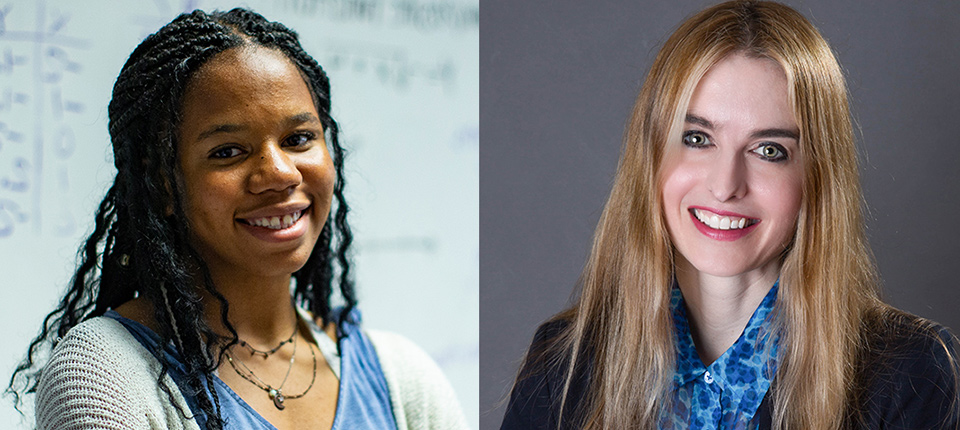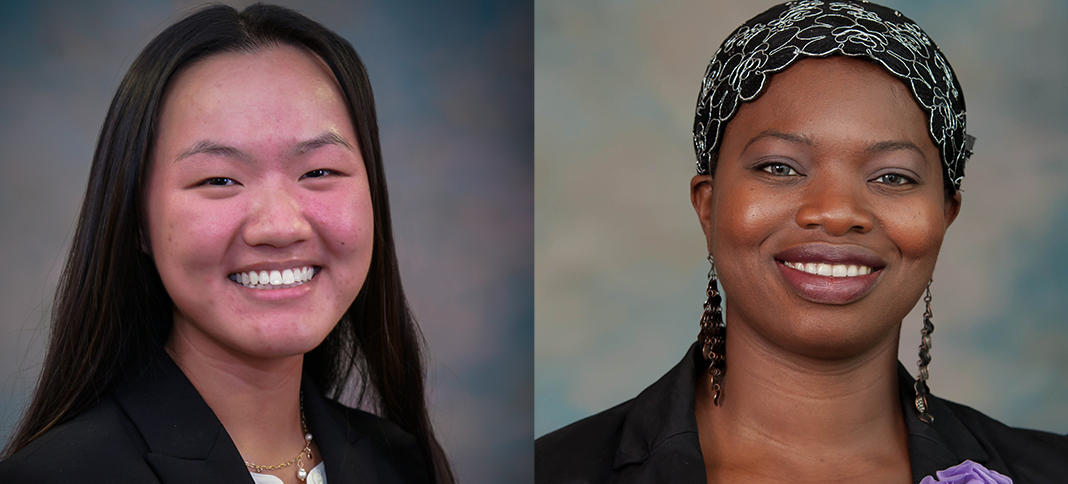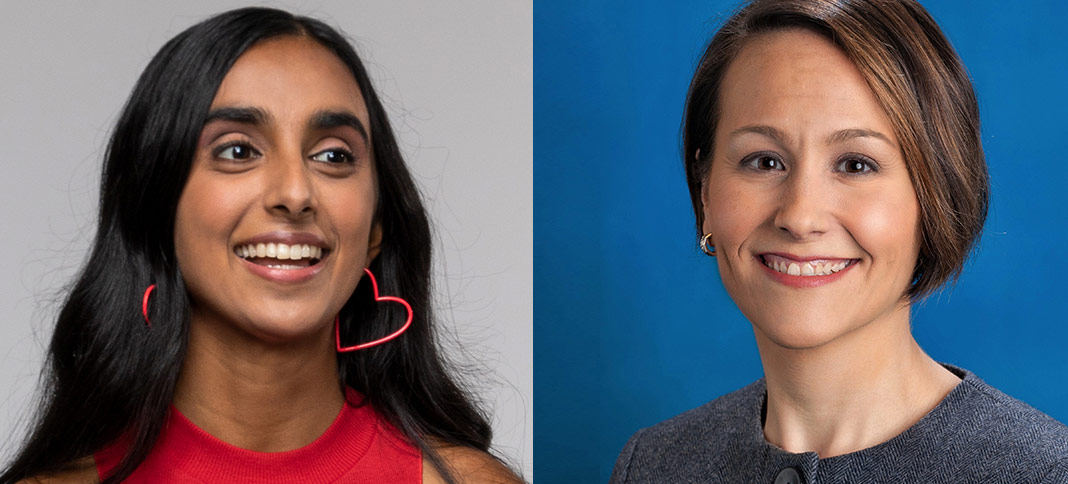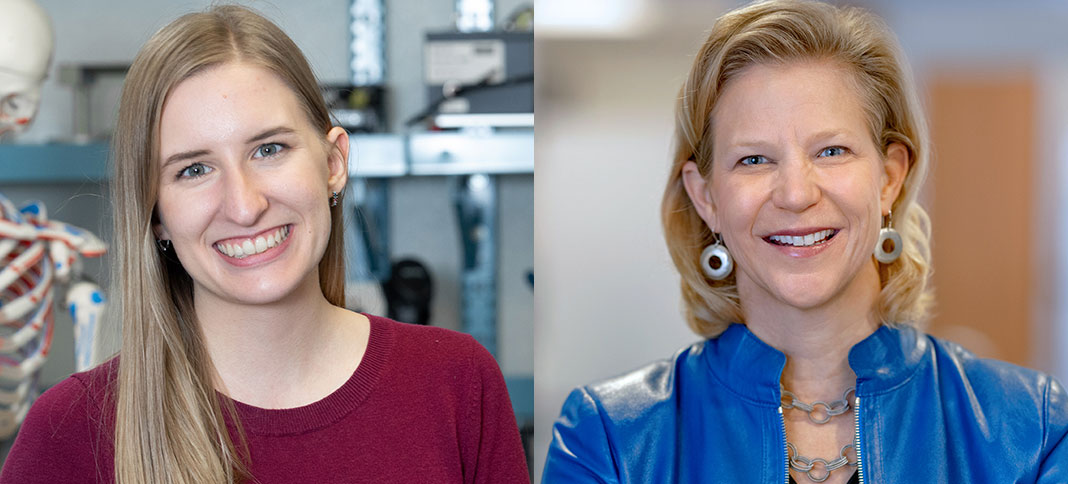
Podcast: How Confidence Can Open Doors in STEM
Lisa Earnhardt – the head of Abbott's Medical Devices division – discusses finding your authentic self with intern Stephanie Slowik.
Oct. 21, 2021
- Copy Link
- Share on X
- Share on Facebook
- Share on Linkedin
Available in latest versions of Chrome, Safari, Firefox and I.E. 11.12+
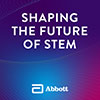 | Listen, download and subscribe to our podcast channel: |
In this edition of Shaping the Future of STEM, college intern Stephanie Slowik, who is majoring in bioengineering and biomedical engineering at the University of Illinois at Urbana-Champaign, speaks with Lisa Earnhardt, executive vice president of Abbott's Medical Devices division. Listen as Lisa and Stephanie discuss what the future looks like for women in STEM and how to find your confidence.
Stephanie, who also is an Abbott campus ambassador, is the latest host on Shaping the Future of STEM. Every podcast episode features different female Abbott high school and college interns as they interview female Abbott STEM professionals from across the company. As a global health technology company committed to providing opportunities for students in science, technology, engineering and math, we offer opportunities around the world including our award-winning high school and college internship programs.
READ THE TRANSCRIPT:
STEPHANIE: Hello, everyone, and welcome to this episode of our podcast. I'm today's host, Stephanie Slowik. I've been an intern with Abbott for five summers and serve as an Abbott Campus Ambassador. Abbott has always encouraged me as a young woman in STEM and I credit that to having so many female STEM role models across the company. Today, I have the honor of interviewing one of those role models, Lisa Earnhardt, who leads Abbott's medical device division. Could we start Lisa with you talking a little bit about your education and background in the STEM fields, and maybe why you were interested in engineering in the first place?
LISA: Yeah, Stephanie. So I grew up in the cornfields of Illinois, not too far from Abbott headquarters and just north of where you are at school. I, you know, gosh, my first job was detasseling corn. And I guess the one thing I learned then that was my internship, I guess, in high school, and I learned there the value of hard work and education. I always loved math and science. And my big brother was an engineer. And so I decided, gosh, between the combination of those two, it made a lot of sense. I did some summer programs exposing me to engineering and made — in high school — and made the decision that yeah, that seemed like the field I wanted to study in college. So I made the leap there. And I think one thing I love about engineering, it's really about applying sort of problem-solving skills to a lot of some of the most challenging issues that we face in the world. So it's been a, it's been a great career to build from.
STEPHANIE: So moving from corn to healthcare, you've been now in health technology for 25 plus years, have you noticed any changes, big or small, regarding women in science and that field? For example, maybe opportunities for women in leadership or career development?
LISA: Yeah, you know that the field has changed quite a bit. I mean, I just think about even when I was in college as a female engineer, and I remember it was oftentimes there was, you know, probably a quarter of the class that was maybe female, and that was probably at the high end. And so as I think about sort of my early days in working in healthcare, and in particular medical technology, there was definitely more of a dominant male culture. I think things have changed pretty, pretty significantly. Just even if I go to colleges today, I'm guessing the makeup of the classroom is very different than what it was when I was in school. So I think we've come a long way. But we have a long way to go both in terms of recruiting talented females into STEM fields, as well as retaining them and continuing to see their careers flourish over the years.
STEPHANIE: I'm sure because of people like you and others across the country, I've probably had a little bit easier experience than you might have. And I'm glad that it just keeps getting better and better. And those women in STEM keeps on increasing. And that's actually a great segue to my next question. In doing some research for this podcast, I came across an article by the Pew Research Center about the phenomenon known as the leaky pipeline, which definitely relates to what you were just talking about retaining women in STEM. So, the research study said women with a college degree in engineering are less likely than men to actually be working in the field of study that they had studied throughout college. Based on your experience, what do you think is needed to recruit and retain that next generation of female scientists and engineers?
LISA: Yeah, you know, the recruiting piece, I think we're doing a reasonably good job of and that sort of reaching in and identifying, you know, high potential individuals earlier, making sure they understand the benefits and role and impact they could have in the STEM fields. I think the challenge for us is really retaining at this point. And I think there's a couple of things there, one of which is really identifying potential early individuals. And so making sure you're taking a really purposeful career planning exercises with folks who develop promising talent. And so not letting it just happen by chance but being very purposeful about career development for high potential women. And then I think also providing support. So we all go through life stages. It was very different when I was young and single and could move anywhere and could travel anywhere and all those types of things. Well, things changed when I had my son, right. And so and just recognizing that it isn't a female, like there are uniquely some things that we do better, or we're the only ones who do it, like having children, right. And so or bearing children. And so there's some things that will need to be different. And just recognizing those differences and providing support around it, you know, surround women, whether it be, you know, resources, like childcare, or certain policies that really promote women at every stage of their lives. So I think there's a couple of different things to really help with that retention. I think it's something that, you know, not just at Abbott, and not just the med tech industry, but we're still working towards, how do we make sure that women are, you know, we're giving them a sort of a fair and equitable shot at some of the top jobs? Because we have to recognize there are differences in terms of their life's path and we need to celebrate those and support those.
STEPHANIE: That's a great point. I know that right now, in college, having a family and doing those things aren't really in my immediate point of view. But looking ahead, I think that's really important. And I know, I've seen plenty of articles about Abbott being really great for working mothers. And although it's far out, I think that that's really encouraging. So, the next question, I noticed that our society tends to add the adjective female in front of important terms like CEO, engineer, and leader. How do you think we as a society can change our language to encourage women to hold these roles, yet not discredit their success by focusing on their gender?
LISA: Yeah, it's so interesting, you never hear male CEO, right. So I think it's a little bit of a double-edged sword. By calling it out you're highlighting the achievements of women. You're setting forth a role model. You're celebrating the success. But then also calling it out by using that female as an adjective, you know, it's different than what you would typically do with an exceptional CEO. You might call them visionary CEO or impactful or world-changing or top-performing CEO. And so I do think, you know, the issue is, both, you know, it's as simple as sort of word choice, right. But because we treat women CEOs is a bit of an anomaly, because there aren't as many leaders in that role, we focus pretty strongly on who those individuals are versus what they've done. And so I do think, as we move forward, it's important to recognize that, you know, don't just focus the conversation on the fact that an individual is female. And, and, you know, what a unique set of circumstances just, you know, it's not bad to acknowledge it, but at the same time, you know, moving the conversation away from sort of femaleness and make it sort of more acceptable to talk about other traits that make them a successful leader or a role model in their own right.
STEPHANIE: How do you think you would want to be described? What are those adjectives you'd rather have than just female?
LISA: Yeah, it's a great question, Stephanie. Maybe visionary, engaging, inspiring. There's lots of other words, you know, once again, I don't mean to take away from being a female CEO. And I do recognize it's, it's important, to me it's important for folks to recognize that women can be CEOs. They can take on major, you know, roles of responsibility, but at the same time, that's not it, right. It can't just be female CEO.
STEPHANIE: I'm looking for adjectives, as goals for my career. So I thought I'd pick your brain a little bit there. So thinking back into your career, can you think of a time where you were feeling challenged. And maybe your decision or expertise was doubted as a woman in STEM, and maybe now as a leader?
LISA: Yes, Stephanie, there's probably more situations or samples than I would like to admit, especially earlier on in my career. You know, but I think a part of that is not so much that, you know, was it that my decisions or expertise was doubted, or did I doubt myself. I do think this is probably, self-doubt is probably a more common trait with at least that I've seen in, in women. And I'll give you an example. So, at one point in my career I was tapped and offered a job to run a national sales force. And I remember when I got the call, I had asked the individual, who was a male, who I would have considered a mentor at the time, I'd asked like, 'You really think I'm ready for this, like really me?' And he said, 'I never want to hear you doubt yourself again.' So you know, it just was so great that he called me out on it. Because I just, it was such a natural thing saying like, 'Gosh I'm not sure I'm quite ready for this.' And he said, 'I never want you to, to think like that. I wouldn't be offering you the job if I didn't think you're ready and you were capable and competent and that you would do a fantastic job.' So it's interesting. So as much as I think, yeah, absolutely, there were situations where I felt like I wasn't, maybe I wasn't heard. And maybe, you know, I would make a suggestion and then literally, some male colleague would make the same suggestion 10 minutes later, and they'd be like, 'Great idea, Joe.' But I think part of which, too, is just my own self-doubt. And just remembering that you didn't get to where you are by accident. It doesn't happen that way. So sometimes that own inner voice can be our worst enemy.
STEPHANIE: That's so encouraging that you were able to recognize it, and you had a support there to help you, you build yourself. I feel like I struggle with that too, that imposter syndrome of, is this right for me? Did I deserve this? Did I, what did I do to get this? But I think you're totally right. It's that, it's that inner voice that could make or break and positive self-talk, positive mentality, is really important there. So, at what time in your career have you felt most challenged, and how did you persevere?
LISA: I think, early on in my career, I had a role where I was a marketing manager, and I was leading a significant product launch for the company, high profile, high impact. I was working with a cross-functional team, where many of the folks actually didn't report to me. And so I had to influence them as a team leader. And it was really challenging. The timelines were tough. The goals were ambitious. I was working like a dog. And I think, in terms of perseverance, part was really just focusing on the end goal, and just keeping that in mind. Because you sometimes you get caught up. There's just so much happening when you're working on a major project like that you sometimes, you know, lose the, you know, lose sort of what ultimately is most important. Secondly, is really focusing and ensuring I'm surrounding myself with great people, both personally and professionally. Folks I feel like who want me to win, who are my best cheerleaders. And then, my husband always says, 'Lisa, take 10 deep breaths. You know, just relax, take a deep breath. Take 10 deep breaths, even better, and just reflect on the situation.' Because oftentimes situations aren't as challenging as you think they might be in the moment. And there's oftentimes a solution to the problem that you're facing at any given time. It's just putting it all in perspective.
STEPHANIE: I think I need to remember that, take 10 deep breaths. I feel I can get worked up in the same way, in those stressful situations. One of the most common things I hear when I tell somebody I'm majoring in bioengineering is 'Wow, that must be so hard.' And sometimes I feel like this mentality can be a little bit of a barrier to my success. Do you have any advice for me and other young women who may feel limited by others' expectations?
LISA: Yeah, I think it, just own it. Like, 'Yeah, it is hard. And it's super challenging. And I love it.' And just kind of putting it back on them. Because that's probably not the response they're expecting. They're expecting to see some of that self-doubt we talked about earlier come through. And in this case, just say, 'Yeah, it is challenging. And that's one of the reasons I love what I'm doing so much.'
STEPHANIE: I love that. One of the things my, my roommate and I like to say is like, we can do hard things. And when we're, we're both bioengineers. And when we're sitting working on some long problem, we have to remind ourselves like that, yeah, this is hard, but we can do it. And I think that's an awesome mindset there. What should I or yet other young engineers ask you and other leaders in STEM that I wouldn't yet know what to ask, I wouldn't yet know enough to ask?
LISA: Yeah, probably around the role of risk taking. And it's interesting, especially as an engineer, right, you're often taught a very sort of methodical way of thinking and there oftentimes is a right answer, right. Well as it turns out in the real world, not so many right answers. And so, I think finding opportunities early in your career, and often to practice taking risks, is sort of taking that leap of faith. It's not easy, it's sort of counter to our sort of basic human need of staying safe. It's also counter to how you're being educated right now, right. Where you're getting to a right answer by using you know, data and science. But I think those, you know, that risk-taking mentality and sort of getting some practice early is going to lead to bigger growth. So whether you fail or you succeed, you're just better because of that and I think will help you become more comfortable and confident in the decisions that you make. Because as I say, like in the business world, and in whatever field you go into, the information you're going to get is imperfect and it's going to be nothing like the problem sets that you do every day.
STEPHANIE: In the spirit of risk taking and having the right mindset, what does confidence mean to you?
LISA: Well, I think confidence is critical to success in, in a career, STEM or otherwise. And I always look at it as, just being confident enough to be yourself. It really sort of starts and ends with sort of knowing yourself and what you stand for. And I do think we oftentimes think about our careers and how we show up as a professional, and think about who we're supposed to be, versus who we really are. And I just realized, like, to develop my confidence, just being me, being my authentic self. It's a way I sort of earn trust and respect from others, and just in our own, where I'm strong, and then, and then just recognize, I don't know everything, and that is fine. No one really expects you to. And so I think, to some extent, actually, sort of, you know, recognizing that and just knowing that you're never going to have all the answers, and that's OK. In fact, you know, having some humility doesn't mean a lack of confidence. So, I think from my perspective, that's when I think about confidence is really being yourself and owning it. And, and sort of, and then you can really lead from who you really are versus who you think you're supposed to be.
STEPHANIE: Yeah, I think that's, that's so important. And I know that as we wrap up this, this podcast today, I'm going to take so much of this away with me of, of risk taking and being myself and surrounding myself with people who encourage me. I think those are all things that myself and anyone listening to this should really take to heart. And one last question I have for you, Lisa, that we have been asking at the end of all of our Shaping the Future of STEM podcasts is, would you rather build snow forts or sandcastles?
LISA: Snow forts, hands down.
STEPHANIE: That's, that's coming, coming from someone who's truly from Illinois. That's, that's how, you know.
LISA: We really did grow up in the cornfields Illinois, right. I don't have the opportunity to do it today. I would say on the flip side, way more opportunity to build sandcastles.
STEPHANIE: That makes total sense. Well, thank you so much, Lisa. Thank you for being here today. I really appreciate your time. And I really learned a lot from all your responses.
LISA: Yeah, thanks so much, Stephanie. It's always great to talk to you. I would just encourage you, keep learning, doing what you're doing. It sounds like you're on a great path to success and I think at the end of the day, be you, do you. It's really hard to be someone else. It's way too much work. So be you and I would expect great things to come.
STEPHANIE: Thank you so much.
For more stories and advice from Abbott's female STEM interns and experts, check out our Shaping the Future of STEM episodes wherever you get your podcasts.
For the latest on Abbott’s life-changing technology, get updates directly in your inbox.
Related articles
-
Strategy and Strength
Podcast: How to Find STEM Success? Learn to Pivot.
Neuroscientist Beth McQuiston talks with intern Jomi Babatunde-Omoya about how flexibility builds career success.
-
Strategy and Strength
Podcast: How to Turn STEM Curiosity Into a Career
Microbiologist Zaina Bawa-Mamudu talks with an Abbott intern about mentoring, diversity and curiosity.
-
Strategy and Strength
Podcast: How to Find Support When You're Studying STEM
Abbott intern Diya Iyer talks with Betsy Wille about how to find support when you're studying STEM subjects.
